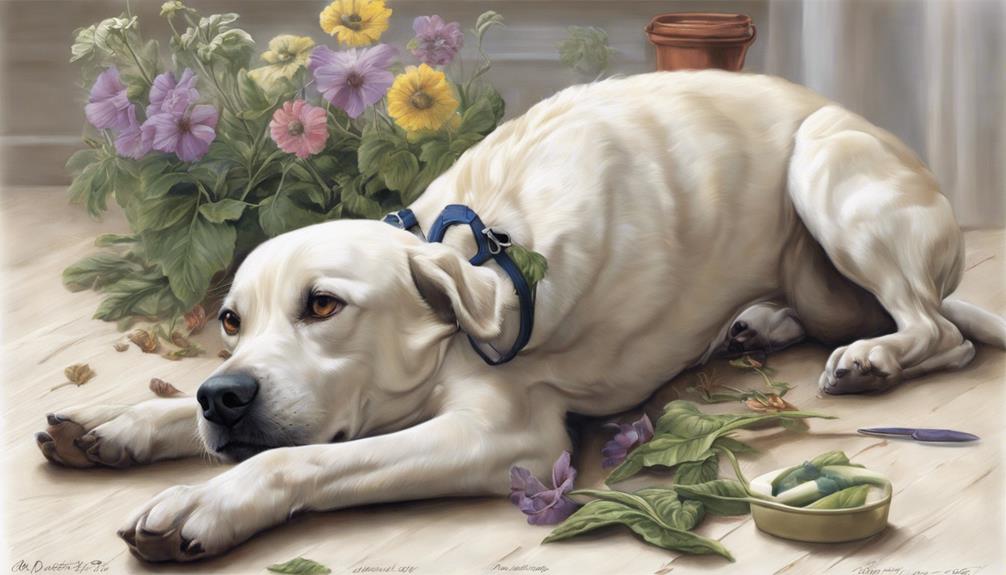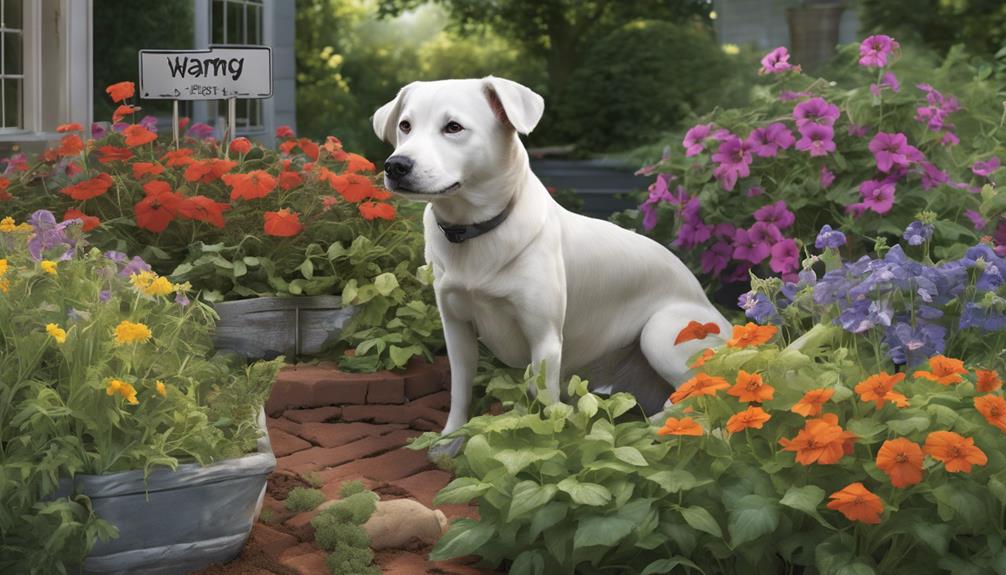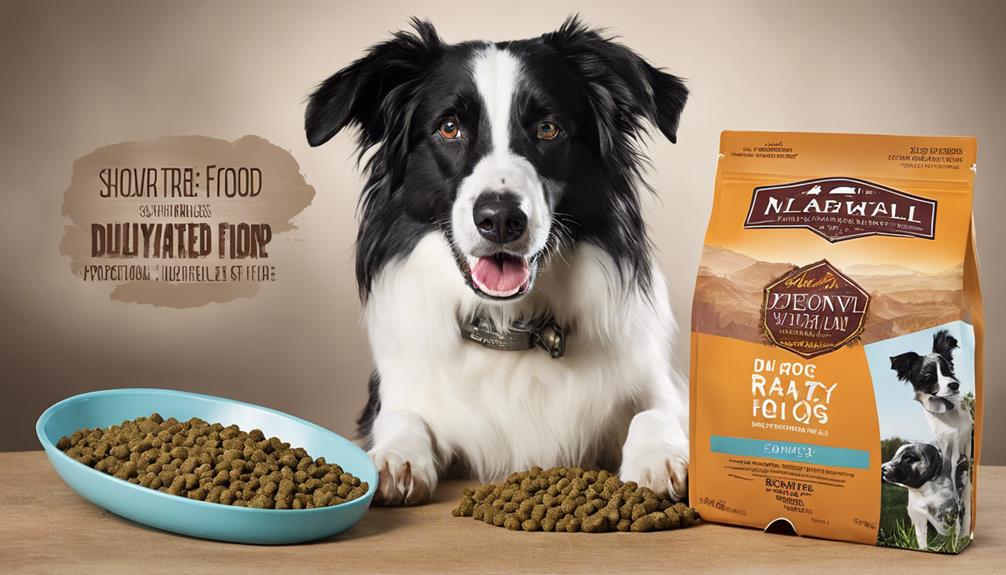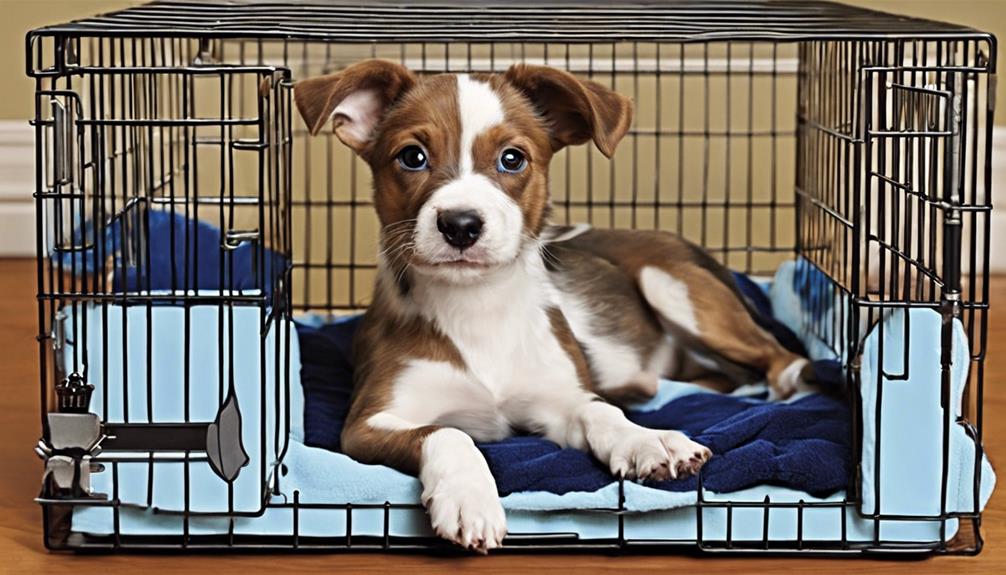Nightshade poisoning in dogs can be critical. Symptoms include vomiting, diarrhea, drooling, dilated pupils, and shallow breathing. Immediate vet care is essential. To prevent toxicity, keep dogs away from nightshade plants. Recognize symptoms like hypersalivation and gastrointestinal upset. Quick action is key; contact a vet promptly. Swift treatment is necessary; induce vomiting and use activated charcoal. Knowing toxic plants helps keep pets safe. Understanding plant toxins can prevent accidents. Nightshade plants have harmful substances like solanine. Be vigilant to safeguard your pet's health.
Key Takeaways
- Nightshade toxicity in dogs causes symptoms like vomiting, diarrhea, dilated pupils, and shallow breathing.
- Immediate veterinary care is crucial to prevent serious complications from nightshade ingestion.
- Recognize symptoms of poisoning like hypersalivation, inappetence, and behavioral changes promptly.
- Prevent nightshade exposure by keeping plants out of reach and monitoring pet's outdoor activities.
- Educate yourself on toxic plants like nightshade to safeguard pets from poisoning incidents.
Nightshade Toxicity in Dogs
Nightshade toxicity in dogs results from the ingestion of substances such as solanine, saponins, and atropine-like compounds found in the plant. These toxic components are particularly harmful to our furry friends, causing symptoms like vomiting, diarrhea, drooling, dilated pupils, and shallow breathing. Among the plants in the Solanaceae family, deadly nightshade is especially dangerous to dogs if consumed.
When a dog shows signs of nightshade poisoning, immediate veterinary care is vital to prevent serious complications. To safeguard our canine companions, it's imperative to keep them away from nightshade plants, educate ourselves on toxic flora, and regularly monitor their surroundings for potential exposure.
Recognizing Symptoms of Poisoning

Identifying symptoms of poisoning in dogs is essential for prompt recognition and intervention to guarantee their well-being. When it comes to nightshade toxicity, being able to recognize the signs early can make a significant difference in your pet's recovery. Here are some common symptoms to watch out for if you suspect your dog has ingested nightshade:
| Symptom | Description | Action |
|---|---|---|
| Hypersalivation | Excessive drooling | Monitor closely |
| Inappetence | Loss of appetite | Contact vet for advice |
| Gastrointestinal Upset | Upset stomach, vomiting | Offer water, seek vet advice |
| Drowsiness | Excessive tiredness | Keep dog calm and comfortable |
| Behavioral Changes | Unusual actions or demeanor | Contact vet immediately |
If you notice any of these signs in your dog, especially after exposure to plants like nightshade, it's vital to act swiftly. Contact a veterinarian or the Animal Poison Control Center for guidance and possible treatment options to safeguard your furry friend's safety.
Immediate Veterinary Care Needed

After recognizing the symptoms of poisoning in dogs, the next step is understanding the immediate veterinary care needed to address potential nightshade toxicity. If your dog exhibits signs like dilated pupils, vomiting, diarrhea, confusion, or shallow breathing after potential exposure to nightshade plants, it's vital to seek emergency assistance from a veterinarian. Prompt treatment is essential in cases of nightshade poisoning, as it can be life-threatening to your furry companion.
When you contact the veterinarian, they may recommend inducing vomiting to remove any remaining toxins from your dog's system. Additionally, administering activated charcoal can help absorb the toxins and prevent further absorption in the digestive tract. Your veterinarian will provide supportive care, such as intravenous fluids or medications, to stabilize your pet and monitor for any complications that may arise.
Preventing Nightshade Exposure

To safeguard your pets from potential nightshade poisoning, it's important to take proactive measures in preventing their exposure to these toxic plants. Keep nightshade plants out of reach of your pet to avoid accidental ingestion. Educate yourself on how nightshade plants look so you can quickly recognize and remove them from your pet's surroundings.
Monitor your pet's outdoor activities to make certain they don't come into contact with any nightshade plants. Consider using pet-friendly barriers or fencing to block access to areas where nightshade plants may grow. If you suspect that your pet has ingested any part of a nightshade plant, seek immediate veterinary help.
Educating on Toxic Plants

Let's understand the importance of recognizing toxic plants like nightshade to keep our furry friends safe.
Knowing the specific toxins in these plants, such as solanine and atropine-like substances, can help us prevent poisoning incidents.
Plant Toxicity Facts
Understanding the toxicity of plants like nightshade is crucial for safeguarding our furry companions from potential harm. Here are some important facts about plant toxicity:
- Nightshade plants contain harmful substances like solanine and saponins, which can be toxic to dogs.
- The leaves and berries of nightshade plants have the highest levels of toxins that can cause severe poisoning in dogs.
- Symptoms of nightshade poisoning in dogs include vomiting, diarrhea, dilated pupils, drooling, and shallow breathing.
Being aware of these facts can help pet owners recognize the dangers of toxic plants and prevent accidental ingestion. Educating ourselves about the risks associated with plants like nightshade is vital for keeping our pets safe.
Pet Safety Tips
Educating ourselves about the toxicity of nightshade plants is important for safeguarding our furry companions from potential harm. Recognizing common names like deadly nightshade and black nightshade is essential to identifying these toxic plants in our surroundings.
By understanding the toxicity of nightshade plants and the specific toxins they contain, such as solanine and saponins, we can take proactive measures to protect our pets. It's significant to monitor our environment for any nightshade plants present and promptly remove them to guarantee our pets' safety.
If ingestion is suspected, seeking veterinary help immediately is crucial to prevent any serious consequences. Educating ourselves and others about the dangers of nightshade plants is key to keeping our beloved pets out of harm's way.
Monitoring and Prompt Action

To effectively protect our canine companions from nightshade poisoning, vigilant monitoring for symptoms and immediate action upon suspicion are essential steps to guarantee their well-being.
- Monitor for Signs: Keep a close eye on your dog for symptoms such as vomiting, diarrhea, and dilated pupils after potential exposure to nightshade plants. Early detection is key to prompt treatment.
- Contact a Veterinarian: If you suspect nightshade poisoning in your dog, don't hesitate to contact a veterinarian immediately. Professional care is critical in such cases to ensure the best outcome for your furry friend.
- Preventative Measures: To avoid accidental ingestion, make sure nightshade plants are out of your dog's reach. Educate yourself on the signs of nightshade poisoning, allowing you to take quick action if exposure occurs. Additionally, pet-proof your home and yard to minimize the risk of ingestion.
Frequently Asked Questions
What Are the Symptoms of a Deadly Nightshade Dog?
When a dog is poisoned by deadly nightshade, symptoms can include dilated pupils, vomiting, diarrhea, confusion, and behavioral changes. Additionally, dogs may display signs of CNS depression, weakness, slow heart rate, and excessive drooling.
If you suspect your dog has ingested deadly nightshade, seek immediate veterinary care. Treatment may involve inducing vomiting, administering activated charcoal, and providing supportive care.
To prevent poisoning, keep dogs away from deadly nightshade plants and other toxic flora.
What Do I Do if My Dog Ate Nightshade?
If your dog ate nightshade, contact the ASPCA Animal Poison Control Center at (888) 426-4435 for guidance. Seek immediate veterinary care for potential poisoning.
Keep nightshade plants away to prevent ingestion. Educate yourself on toxic plants for your dog's safety.
How Do You Stop Nightshade Poisoning?
If you suspect nightshade poisoning in your dog, seek immediate veterinary care to halt toxic symptoms. Avoid inducing vomiting without professional guidance to prevent complications.
Keep nightshade plants out of reach and educate yourself on toxic plants to avoid poisoning incidents.
Monitor your dog's environment, especially during outdoor activities, to minimize exposure to poisonous plants like nightshade.
Contact the ASPCA Animal Poison Control Center at (888) 426-4435 for assistance.
How Do You Prevent Nightshade?
To prevent nightshade poisoning in dogs, we recommend keeping these plants out of reach and educating yourself on their appearance.
Use pet-proof barriers and monitor your furry friend closely during outdoor activities.
If you suspect ingestion, seek immediate veterinary help.
Conclusion
To summarize, being aware of the signs, symptoms, and prevention of nightshade poisoning in dogs is vital for their well-being.
Just like a vigilant gardener keeps a watchful eye on their plants to guarantee they thrive, pet owners must stay attentive to protect their furry friends from harmful substances.
By educating ourselves on toxic plants, monitoring our surroundings, and taking prompt action if poisoning occurs, we can keep our dogs safe and healthy.









